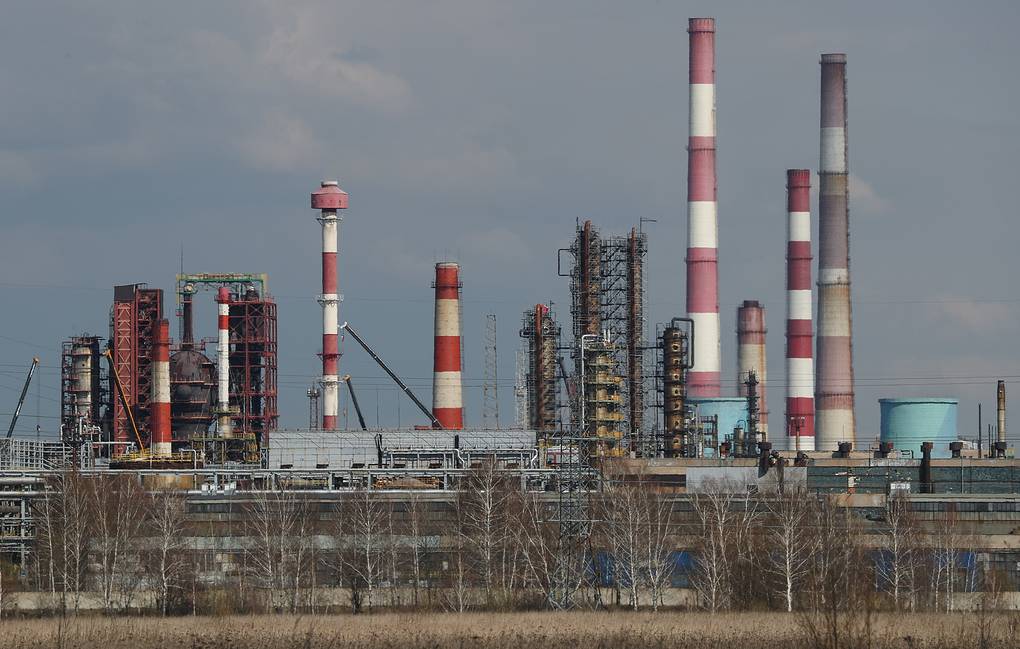Press review: Russian industry on the rise and Roscosmos to look for life on Jupiter

Izve0stia: New Western sanctions won’t affect energy sector
The new package of Western sanctions against Russia may be sensitive for specific banks yet does not change the overall strategic picture. On April 6, the US and the UK announced new restrictions against several Russian banks, banned investment in the Russian economy and updated the lists of personal sanctions. However, the EU could not coordinate positions on new restrictions against Moscow. Differences of opinion arose on restrictive measures against the energy sector.
According to Program Director of the Russian International Affairs Council Ivan Timofeev, the new restrictions do not seriously impact the general state of affairs, since there is already a large volume of formal and informal sanctions against Russia. “In January, these sanctions would have been perceived as a major event yet now, unfortunately, it is already a familiar landscape,” the expert explained.

The EU was talking about decreasing its dependency on Russian gas even before February 24. However, now this is Brussels’ priority – the European Council plans to do so before 2030. According to Izvestia’s informed source, the EU plans to move away from Russian coal first, then from oil, and only after that cease using Russian natural gas. The source noted that Russia’s special military operation in Ukraine has prodded the EU to reject its energy products quicker, yet it is not possible to do so at once since it would severely harm European residents.
According to Timofeev, terminating deliveries of Russian fuel now would mean “suicide for the economy and the people” thus the process will transpire over several years. “Gradually, they will search for the energy conservation mechanisms and replacements for these volumes that will potentially disappear due to the confrontation with Russia,” the expert said, noting that the EU will probably work on decreasing its share of Russian energy products over three or more years.
Nezavisimaya Gazeta: Russian industry on the rise post-sanctions
This March’s industrial production numbers totaled 4.5% more than last March, the Institute of Economic Forecasting of the Russian Academy of Sciences revealed on Wednesday. The increased production growth even following anti-Russian “sanctions from hell” is attributed to enterprises having a stock of materials and products and remaining demand for Russian export products. However, the situation is not so optimistic with domestic demand. It is precisely the low, decreasing demand which is the main obstacle for the business sector according to surveys of enterprises conducted by the office of Presidential Commissioner for Entrepreneurs’ Rights Boris Titov.
According to Deputy Director of the HSE Development Center Institute Valery Mironov, the stock of raw materials and spare parts is what is holding back the immediate decrease in the processing industry. “Such supplies are normally made by the enterprises for a period of one to two-three quarters,” he explained. In his opinion, Russia has several months in order to establish alternative channels for the delivery of these products.
As for the factors limiting business and economic growth, then, according to surveys by the Federal State Statistics Service, the current economic uncertainty remains the main restriction, the expert reiterates. “The economy turned out to be secondary in relation to politics, the economic situation can cardinally change over a short period which creates major stress for any business,” the economist noted.
March’s industrial growth in Russia may be attributed to the fear of those countries that critically depend on Russian energy supplies and are now trying to increase their stock of Russian raw materials over the threat of embargo, according to chief analyst at TeleTrade Mark Goikhman. He notes that the March growth in Russia’s industrial sector occurred mostly due to the increased oil and gas production while there was a drop in the transport sphere, so March’s results were not positive for all large enterprises. He pointed to the drop in car sales and consumer lending which indicates a sharp decrease in consumption in March and possibly for the following months. “So, in March, small and medium enterprises which are oriented towards the domestic market may have carried much more losses than large enterprises,” the analyst thinks.
Vedomosti: Government expects default to be announced on Russian Eurobonds
The government is considering the scenario of investors from “unfriendly” countries announcing a default on Russian foreign currency debts, several sources close to the government told Vedomosti. On April 6, it was announced that a foreign correspondent bank refused to fulfill payments on a warrant and the main sum of the debt on sovereign Eurobonds, so the ministry was forced to move funds to the specially created Russian bank accounts in rubles.
One of the sources explained that the government has no alternative mechanisms of handling the sovereign debt. It is possible to make payments in dollars or euros only from the Central Bank’s or state accounts that have been frozen by the US and European countries.
However, Sputnik Asset Management Director General Alexander Losev thinks that creditors have no grounds to go to court to file for an issuer’s default. The change in currency used to pay for a loan should not be considered a substantial violation of the conditions of the emission.
There certainly will be economic consequences for Russia should investors acknowledge the default on obligations, in particular, the country won’t be able to enter external capital markets, yet under the current conditions it is useless anyway, the expert added. He concluded that the ultimate goal of the US is to stage a provocation and to accuse Russia of financial wrongdoing by creating a technical default situation.
The West’s main motivation is for Russia to pay out of current foreign currency revenues and not out of reserves, according to professor at the Higher School of Economics Alexander Abramov. Recognizing the default will be a problem for Western investment funds but not a significant one since Russian Eurobonds do not occupy a significant share in the portfolios of major institutional investors, he added.
Vedomosti: Arms race kicks off in Southeast Asia
China has accused the US, the UK and Australia of undermining peace and stability in the Asia-Pacific region due to their development of hypersonic weapons, Chinese Foreign Ministry Spokesman Zhao Lijian said at a briefing on April 6.
High-technology programs announced by AUKUS demonstrate a rather solid approach to the all-encompassing confrontation with an outlook to the future, according to Research Fellow at the Russian Academy of Sciences’ Institute of World Economy and International Relations Dmitry Stefanovich. The directions the three countries are operating in are all very pertinent, and they have been pouring their resources into them for years. That said, the stress on tri-lateral cooperation emphasizes that today nobody can work in all these innovative directions at once on the national level alone, the expert explained. In his opinion, the arms race in the Asia-Pacific region is above all a qualitative one and a lot of parties participate in it in various ways. The expert thinks that the situation does not look stable, yet hope remains that all the parties involved will recognize the “security dilemma,” that is, that any investment in boosting one’s own security would be perceived by others as undermining their security.
AUKUS’ new technological programs will lead to a clearer demarcation of adversarial blocs in the region, according to Alexander Yermakov, a military expert with the Russian International Affairs Council. In response to Western developments, China will also invest in creating new armaments. The expert notes that this initiative by AUKUS may cause all countries in the region to step up their defense spending.
Izvestia: Roscosmos intends to look for life on Jupiter’s moons
The Zeus nuclear-powered space tug can deliver a satellite to Jupiter which will try to locate signs of life on the planet, Roscosmos Executive Director for Long-Term Programs and Science Alexander Bloshenko said in an interview with Izvestia.
“Additionally, we will search Jupiter’s moons for signs of life. To be more precise, we plan to check Jupiter’s moons for the presence of so-called biomarkers and the conditions potentially suitable for life,” he explained.
According to Bloshenko, this would be a major breakthrough for mankind. He is confident that a major leap would be accomplished in many spheres, including biochemistry, medicine and pharmacology.
The Roscosmos executive stressed that to date, it had been established that some of Jupiter’s moons have ice-covered oceans with vapor emanating. “It would be interesting to fly through an ’emission’ of vapor, but a separate special satellite is needed which Zeus can also bring along as part of the payload module,” he noted.
TASS is not responsible for the material quoted in these press reviews
Source: TASS









